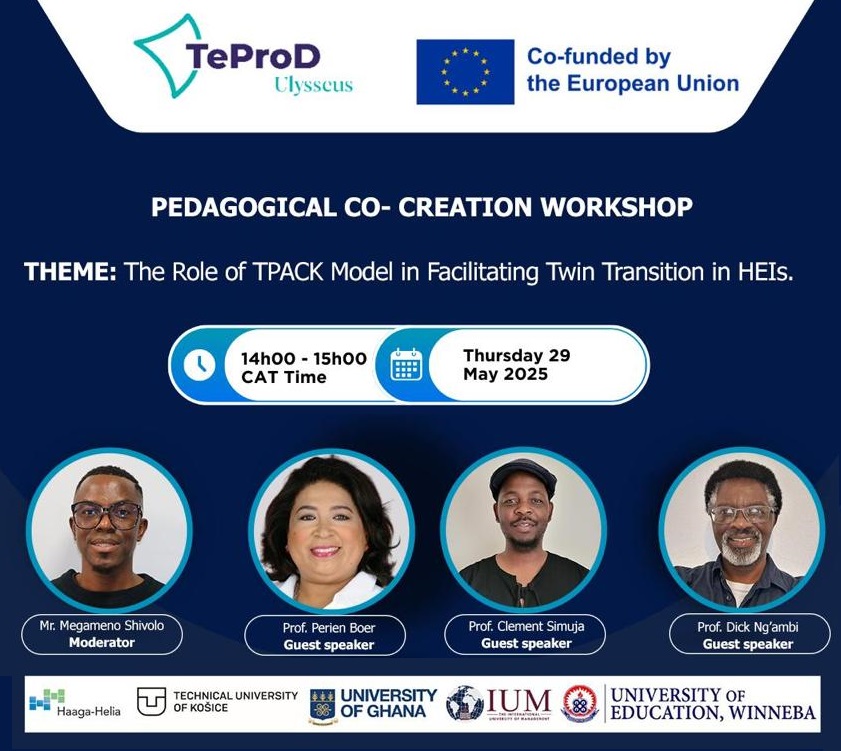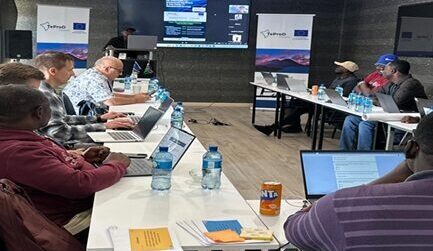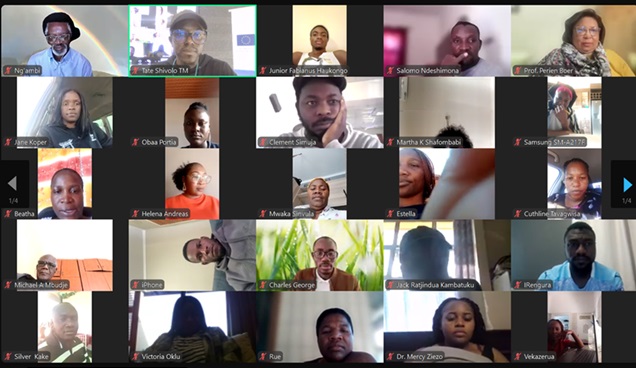
The International University of Management (IUM) has recently conducted the TeProD Pedagogical Co-Creation workshop on the theme: “The Role of the TPACK Model in Facilitating Twin Transition in Higher Education Institutions”. Held on 29 May 2025 in hybrid mode, the workshop gathered a combined total of 238 participants, including 222 participants who joined virtually and 16 TeProD partners who attended physically at the Atlantic Villa in Swakopmund, Namibia. This workshop is part of a series of co-creation workshops conducted by the TeProD project partners. These partners includes the host partner, The International University of Management (IUM), University of Ghana (UG), University of Education, Winneba (UEW), Haaga-Helia University of Applied Sciences (HHUAS), and the Technical University of Kosice (TUKE).
The event attracted various participants including students, lecturers, researchers, and academic professionals from Namibia, South Africa, Botswana, Ghana, Slovakia, and Finland. The attendees were 150 students pursuing undergraduate, master’s, and doctoral programs , and 88 professionals who were either university professors, administrators, school principals, lecturers, or project coordinators and partners. Gender representation was commendable and remarkable, as 150 females and 88 males attended.
The aim of the workshop was to explore how the Technological Pedagogical Content Knowledge (TPACK) model can be employed as a pedagogical instrument in preparing lecturers for the twin transition in Higher Education Institutions (HEIs). The twin transition is herein described as the concurrent integration of digital technologies and green and/or sustainable approaches in teaching and learning in HEIs. Developed by Mishra and Koehler in the early 2000s, the TPACK model depicts the reflective overlap of technology, pedagogy, and content knowledge to enhance the quality of teaching. The model was presented as an instructional design plan for preparing educators to cope with the challenge of this dual shift than as a theoretical concept.
To this end, TPACK offers a strong foundation for lecturers to incorporate technological innovations into ecologically sound pedagogical practice. TPACK enables the creation of learning experiences that are technology advanced and lead to sustainability goals. This holistic methodology makes sure that digital transformation and sustainability are not parallel endeavours, but complementary factors of effective pedagogy in higher education.
The workshop commenced with the opening remarks which highlighted an overview of the TeProD project’s objectives and goals, followed by a facilitated panel discussion with speakers from the University of Namibia, Rhodes University, and the University of Cape Town. The speakers shared insights on institutional challenges, best practices, and possibilities for co-creating curricula influencing digital tools integration in HEIs. Participants were also engaged actively by questioning, reflecting on their own experiences, and considering how the lessons learned could be applied to their local contexts.
The session concluded with a summary from each speaker, re-articulating the key issues, and emphasizing the importance of collaborative learning in transforming higher education. The participants were invited to provide feedback through an online evaluation survey, providing recommendations for future workshops. Ultimately, the session demonstrated the pivotal role that universities will need to take in leading the change towards sustainable,
technologically supported teaching and learning environments in the global higher education community.

